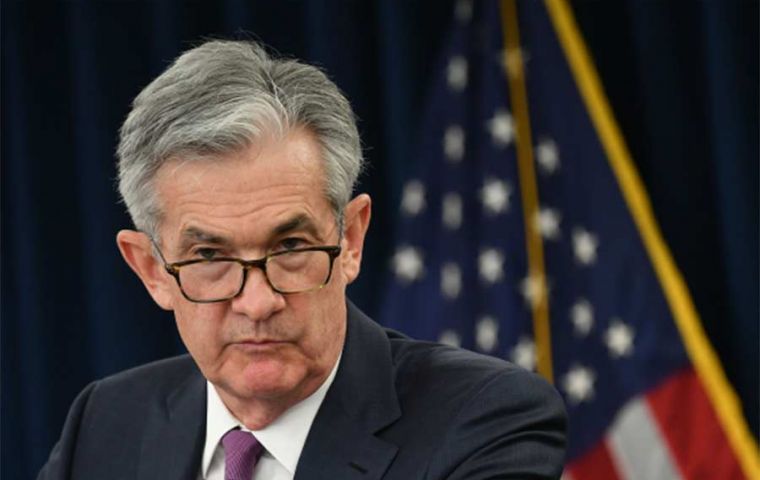MercoPress. South Atlantic News Agency
Fed raises the benchmark interest rate 75 basis points, fourth time running
 Fed Chair Powell explained the decision saying that inflation is still “much too high,” adding that a further “unusually large” increase in the rate may yet come
Fed Chair Powell explained the decision saying that inflation is still “much too high,” adding that a further “unusually large” increase in the rate may yet come For the fourth time running since March the United States Federal Reserve on Wednesday increased benchmark interest rates 75 basis points to its highest level since 2018, in yet another significant effort to contain inflation which is running at a forty-year high of 9,1%, but at the same time avoiding a recession.
Federal Reserve Chair Jerome Powell explained the decision saying that inflation is still “much too high,” adding that a further “unusually large” increase in the rate may yet come in the next meetings of the Federal Open Market Committee.
The aim of the Fed is to increase the cost of borrowing, for example for a car or a mortgage on a house, so that consumers are less likely to borrow and spend. The hope is then for the economy cools and for inflation to slow down to the pre established objective of 2%.
But with the US economy already slowing down, the interest rate hike may be increasing the risk of inducing a recession.
For President Joe Biden and his Democratic Party, the deterioration of consumer confidence could be a bad omen ahead of the coming November midterm election approaching. Biden's popularity has taken a hit amid general discontent, raising the possibility of the Democrats losing their majority in the House of Representatives and Senate.
However, some analysts predict that any recession may be relatively mild, thanks to the generally good financial shape of many households and the low unemployment rate.
As in the rest of the main Western economies, and as inflation gathers pace, central banks have started to increase benchmark interest rates. Such are the cases of UK, Canada, Australia and even the European Central Bank raised the interest rate for the first time in eleven years.
Markets reacted positively as the increase was anticipated. Follows the FOMC release with unanimous support,
Recent indicators of spending and production have softened. Nonetheless, job gains have been robust in recent months, and the unemployment rate has remained low. Inflation remains elevated, reflecting supply and demand imbalances related to the pandemic, higher food and energy prices, and broader price pressures.
Russia's war against Ukraine is causing tremendous human and economic hardship. The war and related events are creating additional upward pressure on inflation and are weighing on global economic activity. The Committee is highly attentive to inflation risks.
The Committee seeks to achieve maximum employment and inflation at the rate of 2 percent over the longer run. In support of these goals, the Committee decided to raise the target range for the federal funds rate to 2-1/4 to 2-1/2 percent and anticipates that ongoing increases in the target range will be appropriate.
In addition, the Committee will continue reducing its holdings of Treasury securities and agency debt and agency mortgage-backed securities, as described in the Plans for Reducing the Size of the Federal Reserve's Balance Sheet that were issued in May. The Committee is strongly committed to returning inflation to its 2 percent objective.
In assessing the appropriate stance of monetary policy, the Committee will continue to monitor the implications of incoming information for the economic outlook.
The Committee would be prepared to adjust the stance of monetary policy as appropriate if risks emerge that could impede the attainment of the Committee's goals. The Committee's assessments will take into account a wide range of information, including readings on public health, labor market conditions, inflation pressures and inflation expectations, and financial and international developments.
Voting for the monetary policy action were Jerome H. Powell, Chair; John C. Williams, Vice Chair; Michael S. Barr; Michelle W. Bowman; Lael Brainard; James Bullard; Susan M. Collins; Lisa D. Cook; Esther L. George; Philip N. Jefferson; Loretta J. Mester; and Christopher J. Waller.




Top Comments
Disclaimer & comment rulesCommenting for this story is now closed.
If you have a Facebook account, become a fan and comment on our Facebook Page!